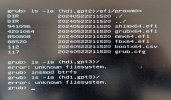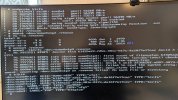Hi,
for my home lab, I wanted to give btrfs a try and since PVE supports btrfs+RAID on root, I decided to give it a try and added a PVE 8.3 node with exactly that into my little 2 node home lab. Things went smoothly so far, but after a recent hard reboot, the node doesn't boot anymore, but throws me into a grub command line instead.
In there, I can successfully access my EFI partition, but I can't access the root partition, grub isn't able to mount it yet at that stage:

I then tried to do a recovery boot from a fresh ISO, but apparently the recovery mode doesn't work for btrfs root devices.
Next I tried to boot the server with a live system and even from there, I can't access any btrfs partition.

My knowledge about btrfs is very limited, so maybe I am missing something essential.
Anyway, I guess it's learning time now ... any help appreciated!
for my home lab, I wanted to give btrfs a try and since PVE supports btrfs+RAID on root, I decided to give it a try and added a PVE 8.3 node with exactly that into my little 2 node home lab. Things went smoothly so far, but after a recent hard reboot, the node doesn't boot anymore, but throws me into a grub command line instead.
In there, I can successfully access my EFI partition, but I can't access the root partition, grub isn't able to mount it yet at that stage:

I then tried to do a recovery boot from a fresh ISO, but apparently the recovery mode doesn't work for btrfs root devices.
Next I tried to boot the server with a live system and even from there, I can't access any btrfs partition.

My knowledge about btrfs is very limited, so maybe I am missing something essential.
Anyway, I guess it's learning time now ... any help appreciated!
Last edited:

